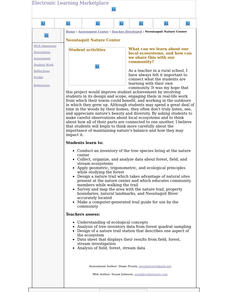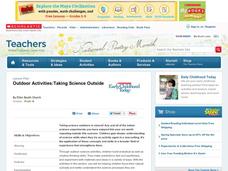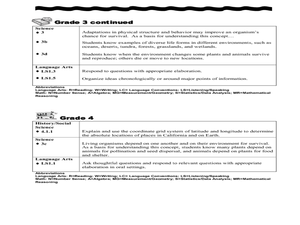TryEngineering
Sorting Socks is Algorithm Complexity
Use hosiery to teach computer science. Scholars use socks to develop a set of algorithms. They find ways to find a particular sock from a set and ways to sort socks. Finally, they use their algorithms to consider time complexity.
Beyond Benign
Crossing Hairs
Can you breed the perfect cat? Scholars study how to control genetic traits through breeding. The 15th lesson in a 18-part genetics unit considers the process of cross-breeding to develop a cat with a specific set of predetermined traits.
Beyond Benign
Great Expectations Through Modification
Explore the changes genetic modifications make just to make it in our world. Scholars track the production of insulin over time and discover how genetic modifications make the treatment of diabetes possible.
Beyond Benign
What is Biotechnology
Examine the sequence of key events in the history of genetics. An engaging lesson asks scholars to sort events to create a timeline of biotechnology milestones. Arranging the events gives learners a perspective on the development of...
Theodore Roosevelt Association
Roosevelt's Legacy: Conservation
The legacy of Theodore Roosevelt carries through modern American politics, economics, foreign policy, and society. But his proudest and most profound efforts were in the world of conservation, and in preserving the natural beauty of...
National Wildlife Federation
Fossil Fuel Extraction Activity
Extracting oil is more difficult than many think! Learners work together and get hands-on as they represent oil companies drilling for oil by simulating oil extraction using beans. They identify the challenges faced in using...
Pace University
Grades 9-10 Energy Sources
Alternative energy sources are becoming increasingly important. Learners have the opportunity to explore alternative energy sources using a differentiated instruction unit. They group together based on ability levels, assign roles to...
Cornell Lab of Ornithology
Jump, Glide, or Fly? Exploring Bird Evolution
How have birds evolved from prehistoric animals? With the three-part lesson, small groups first research different prehistoric animals and determine whether they are birds. Then, scholars explore different bird adaptations using the Flap...
Minnesota Department of Natural Resoures
Tree Life
The life of a tree is the focus of a packet consisting of several activities all covering a different subject. Second graders measure shadows, make pinecone critters, write poems, count rings, complete a word search, play tree tag, and...
National Nanotechnology Infrastructure Network
Big vs. Little - Macro to Micro Lesson 5
It is a long way from nano to macro. Learners examined the scale of measurement from macro to nano in the first four lessons of the five-part series. With the final installment, they review what they learned by classifying objects in one...
NASA
Exploring the Moon
Can plants grow on the moon? The second lesson in a five-part series has pupils explore the resources available on the moon to determine if plant life is possible. They use lava rocks as their soil and draw conclusions about the...
EngageNY
Reading for Gist and Answering Text-Dependent Questions: Chapter 4 of World without Fish
True or false? Scholars read chapter four of World without Fish and explore the idea of a myth. They discuss in triads the meaning of the myth of nature’s bounty. Learners annotate the text on sticky notes and then answer text-dependent...
NASA
The Big Climate Change Experiment Lesson 2: The Influence of Climate on Culture
No conversation about culture is complete without considering climate. Scholars first view videos of climate witnesses who describe the climate in their regions and how climate change affects their daily lives. They then write essays or...
Curated OER
Neotaquit Nature Center: Ecosystems, Science, Technology
Students survey their local forest conducting an inventory of tree species and analyzing data of local ecosystems. They design a nature trail, map the area and make a computer generated trail guide.
Curated OER
Outdoor Activities: Taking Science Outside
Students participate in various outdoor science activities to enhance their observation, classification, and analysis skills. In this outdoor lesson, students begin by observing a tree from a straightforward angle, then from the...
Curated OER
Natural Features as a Resource
Students research how people use land and water features to meet their basic needs. In this natural features lesson, students review land and water features. Students discuss how the land is used to meet needs using a landscape picture...
Curated OER
Applied Evolution: How Will We Get There from Here?
Students explore the basic process of natural selection and how people can manipulate that process today. The consequences of natural selection on daily life and the implications of evolutionary biology in basic and applied science is...
Curated OER
Natural Records of Change: Working with Indirect Evidence of Past Climates
Students take part in a dice game to better explain the differences between direct and indirect evidence. They apply this knowledge to how scientists have used both types of evidence to determine how climate has changed over time.
Curated OER
Earth Pockets
Students identify the Earth's natural resources. In this Earth science instructional activity, students read the book The Great Kapok Tree and discuss types of natural resources. Students use categories such as wood, paper, and trees and...
Curated OER
Sustainability
Fifth graders investigate the concept of natural resources. They participate in a simulation project to see possible uses. They use the internet to study how Hacienda Verde is used as a model for others for sustainable coffee crops.
Curated OER
Renewable vs. Non-Renewable Resources
Fifth graders identify renewable vs. non-renewable resources and comprehend why conservation of resources is important. They are asked what they think the words natural and resource mean. Pupils then put the words together to define...
Curated OER
Don't Use it All Up
Students observe the way that a sponge absorbs liquids and discuss how we our use of natural resources affects the environment around us. They discuss the need to conserve resources so we don't run out of what we need.
Curated OER
A Day in the Life of Bottled Water
Students research natural resources. In this environmental lesson, students define what a natural resource is and explore the life of a single-use water bottle. Students create a waste-reduction plan.
Curated OER
Wow! Water, Trees, Fish!
Students observe the wildlife shown on the Washington state quarter and discuss what the world would be like if there were no natural resources. They complete a worksheet of drawings that depict the world without trees, water or fish.
Other popular searches
- Science Natural Disasters
- Science Natural Phenomena
- Science Natural Resources
- Science Natural Events
- Science Natural Cycles
- Natural Science Grade 9
- 4th Grade Natural Science
- Natural Science Powerpoint
- Natural Science Grade 3
- Science Materials Natural

























